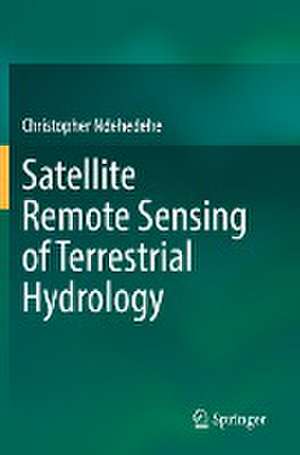Satellite Remote Sensing of Terrestrial Hydrology
Autor Christopher Ndehedeheen Limba Engleză Paperback – 17 iul 2023
| Toate formatele și edițiile | Preț | Express |
|---|---|---|
| Paperback (1) | 909.65 lei 6-8 săpt. | |
| Springer International Publishing – 17 iul 2023 | 909.65 lei 6-8 săpt. | |
| Hardback (1) | 920.52 lei 3-5 săpt. | |
| Springer International Publishing – 16 iul 2022 | 920.52 lei 3-5 săpt. |
Preț: 909.65 lei
Preț vechi: 1109.33 lei
-18% Nou
Puncte Express: 1364
Preț estimativ în valută:
174.06€ • 182.22$ • 144.02£
174.06€ • 182.22$ • 144.02£
Carte tipărită la comandă
Livrare economică 05-19 aprilie
Preluare comenzi: 021 569.72.76
Specificații
ISBN-13: 9783030995799
ISBN-10: 3030995798
Pagini: 688
Ilustrații: XXI, 688 p. 213 illus., 201 illus. in color.
Dimensiuni: 155 x 235 mm
Greutate: 0.98 kg
Ediția:1st ed. 2022
Editura: Springer International Publishing
Colecția Springer
Locul publicării:Cham, Switzerland
ISBN-10: 3030995798
Pagini: 688
Ilustrații: XXI, 688 p. 213 illus., 201 illus. in color.
Dimensiuni: 155 x 235 mm
Greutate: 0.98 kg
Ediția:1st ed. 2022
Editura: Springer International Publishing
Colecția Springer
Locul publicării:Cham, Switzerland
Cuprins
Part 1.- Chapter 1 Introduction.- Chapter 2 Global water sytems.- Part 2.- Chapter 3 Optical Remote Sensing Systems.- Chapter 4 Satellite Geodetic Missions.- Part 3.- Chapter 5 GEE Chapter.- Part 4.- Chapter 6 Remote Sensing of Freshwater Habitats.- Chapter 7 Remot esensing of vegetation changes.- Part 5.- Chapter 8 groundwater from space.- Part 6.- Chapter 9 Impacts of Climate Change on Hydrological Cycle.- Chapter 10 Drought metrics and Indicators.- Part 7.- Chapter 11 Hydrolological variability.- Part 8.- Chapter 12 Statistical methods in hydrology.- Part 9.- Chapter 13 SA_JoH.- Part 10.- Chapter 14 JoH_Regional.- Part 11.- Chapter 15 STOTEN.- Chapter 16 Climatic Change.- Part 12.- Chapter 17 Flinders.- Chapter 18 Mitchell.- Part 13.- Chapter 19 Brazil drought.- Chapter 20 LCB STOTEN.- Appendix.
Textul de pe ultima copertă
This book highlights several opportunities that exist in satellite remote sensing of large-scale terrestrial hydrology. It lays bare the novel concept of remote sensing hydrology and demonstrates key applications of advance satellite technology and new methods in advancing our fundamental understanding of environmental systems. This includes, using state-of-the-art satellite hydrology missions like the Gravity Recovery and Climate Experiment and other multi-mission satellite systems as important tools that underpin water resources planning and accounting. This book discusses and demonstrates how the efficacy, simplicity, and sophistication in novel computing platforms for big earth observation data can help facilitate environmental monitoring and improve contemporary understanding of climate change impacts on freshwater resources. It also provides opportunities for practitioners and relevant government agencies to leverage satellite-based information in a transdisciplinary context to address several environmental issues affecting society. This book provides a general framework and highlights methods to help improve our understanding of hydrological processes and impact analysis from extreme events (e.g., droughts, floods) and climate change.
Caracteristici
Advances the concept of satellite remote sensing hydrology and its applications Demonstrates the use of GRACE satellites in advancing fundamental understanding of hydro-ecological systems Discusses new cloud-based computing frameworks for big satellite remote sensing data analyses
